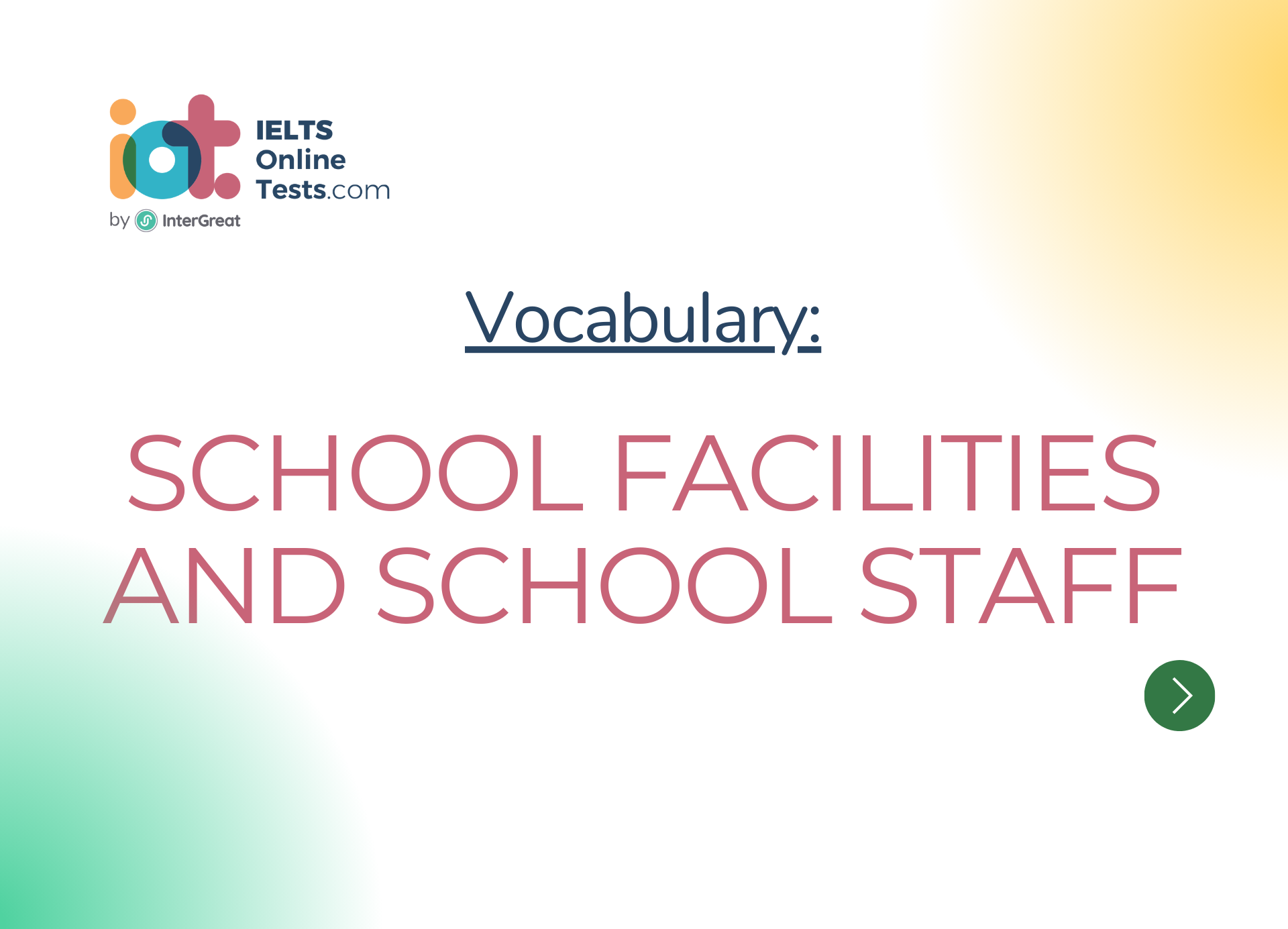
School facilities and School staff
Here's a lesson on vocabulary related to "School Facilities and School Staff" for the IELTS band score 3.0-4.5:
I. School Facilities:
Classroom: A room where students receive instruction from a teacher.
Library: A place where books, magazines, and other resources are stored and available for borrowing.
Laboratory: A space equipped for scientific experiments and practical learning.
Playground: An outdoor area where students can play and engage in physical activities.
Computer lab: A dedicated room with computers for students to use for learning and research.
Gymnasium: A large indoor space for physical education classes and sports activities.
Sports field: An outdoor area designated for sports activities and games.
Auditorium: A large room or hall used for school assemblies, performances, or presentations.
Art studio: A dedicated space for art classes and creative activities.
Music room: A room equipped with musical instruments and equipment for music lessons and practice.
Science lab: A specialized laboratory for conducting scientific experiments and research.
Language lab: A facility equipped with audio and video equipment for language learning and practice.
Staffroom: A designated area for teachers and school staff to relax, prepare lessons, or have discussions.
Cafeteria: A dining area where students can eat their meals.
II. School Staff:
Principal: The head or leader of a school.
Teacher: An individual who instructs students in various subjects.
Librarian: A person responsible for managing and organizing the library.
Counselor: A professional who provides guidance and support to students with academic, personal, or social issues.
Administrator: A staff member who handles administrative tasks and manages the school's operations.
Support staff: Non-teaching staff members who provide assistance and support, such as custodians, secretaries, and nurses.
Guidance counselor: A counselor who assists students with academic and career guidance.
School psychologist: A professional who provides counseling and support for students' mental and emotional well-being.
Physical education teacher: A teacher who specializes in physical education and sports-related activities.
School librarian: A librarian specifically responsible for managing the school's library resources.
Administrative assistant: A staff member who assists with administrative tasks and office management.
IT technician: A person who provides technical support and manages the school's computer systems.
III. School Positions and Roles:
Headmaster/Headmistress: The principal or head of a school.
Assistant principal: A staff member who supports the principal and assists in school administration.
Subject teacher: A teacher who specializes in a particular subject.
Special education teacher: A teacher who provides specialized instruction and support to students with disabilities or special needs.
School counselor: A professional who offers guidance and counseling services to students.
School nurse: A healthcare professional who provides medical assistance and support to students.
IV. School Services:
Transportation: The provision of transportation services for students to and from school.
After-school programs: Activities and programs offered after regular school hours, such as clubs, sports, or tutoring.
Career counseling: Guidance and support provided to students in exploring career options and planning their future.
Student support services: Services and resources available to help students with academic, social, or emotional needs.
Parent-teacher association (PTA): An organization that facilitates communication and collaboration between parents and teachers.
School bus service: Transportation provided by the school for students who live far away.
Student counseling services: Counseling and guidance services provided to students to support their personal and academic well-being.
School meals program: A service that provides meals or snacks for students during school hours.
Career development services: Services and resources offered to help students explore career options and plan for the future.
Learning support services: Specialized support and interventions for students who require additional assistance in their learning.
V. School Events and Activities:
Field trips: Educational outings or visits to places of interest outside the school.
Sports day: A day dedicated to sports competitions and activities among students.
Graduation ceremony: An event to mark the completion of studies and the conferring of diplomas or degrees.
Science fair: An exhibition of student projects and experiments in science-related subjects.
Cultural events: Celebrations or performances showcasing the cultural diversity and talents of students.
.
Remember to practice using these vocabulary words in sentences and conversations to improve your understanding and fluency in English.




